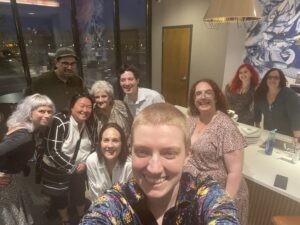A friend who has been to two of my Seders says mine is the table for strays. I guess they’re right. And I like it that way.
I’m a bit of a wayfairing wanderer in spirit. I love to have new experiences and encounters, meet new people, and share old stories. I really can do this anywhere, and I have had magical conversations in waiting rooms, elevators, and electronic chat groups.
I’ve always sought out human adventures. And my favorite time of year for this is Passover.
For Passover, the Jewish community puts up its shingle, declaring that we’ve got a room to rent. Seats are available at all our tables. And the vagabonds like me stand in our doorways and harken them in. (Okay, it’s a bit more orchestrated, but I’m enjoying the metaphors). What actually happens is synagogues, Jewish agencies, and organized Chessed groups (like Cincy Jewfolk) make the clarion call — if you need a place to celebrate Passover, let us match you up!
So people like me get to complete the rabbinic mitzvah of Haknasat Orchim — welcoming guests and making them feel comfortable, respected, and honored. Passover is the perfect time for this. By bringing people to your Seder table, you are able to learn together, teach together, and gain joy in the experience.

This year, my table held 17 people. Of those, seven were not Jewish, three had chosen to be Jewish as adults, and four had never been to a Seder before. One was a referral through the international Facebook group, “Jewish Women Talk About Everything”. A husband and wife came through an introduction at my synagogue. And a brother and sister joined us in response to the outreach of Jewfolk. Plus my adult kid, my transplanted cousin, my senior mother, and my fabulous partner (to name a few).
Because I relish this mixed-up population so much, I make an effort to be inclusive of the disparities. One way I do this is by crafting my own Haggadah every year. I use recustom.com (formerly haggadot.com) and build the service. We get to share the 15 steps in a traditional Seder plan. We also get to speak in at least a couple of languages. And we get to highlight our combined experience with oppression, freedom, discrimination, and strength. I love the chance for this diverse community to tell the stories, ask the questions, and celebrate our liberation (especially with delicious homemade food).
And even more importantly, I get to lead a Seder appropriate to the community at the table. These Seders are a far cry from the Maxwell House Haggadot of my youth. Now I get to indulge in my exploration. There are new ways to tell the story and perform the rituals while honoring the character of the community of attendees. I do that with the stories we tell and the opportunities for participation. And of course, with the food. My tradition is to make three different kinds of Charoset. This year was an Ashkenazi American, a traditional Sephardi Middle Eastern, and an unexpectedly delicious Guatemalan version.
But the real reason for opening the door to all the Seder strays is the conversations. This mixed bag of people ask the most honest and curious questions. They found common experiences to share. The exchange of knowledge under the framework of a Seder is magnificent. It took well over an hour to pull us all back to the table for that 3rd glass of wine. But it was worth it to catch snippets of my kid’s boyfriend’s mother talking about her family rituals in Puerto Rico, with a Jewfolk participant talking about being raised in a Chabad house. Or the recently converted young woman connecting with the woman adopted into a half-Jewish family as they both discussed their new commitment to Judaism.
A lovely new friend heard about my populous table. Her take on it was that the haggadah is missing a son. That’s what I do, and what we should all do, is make room for the 5th son — the one who has never been asked what questions he may have. In that honor, I encourage all of you to open your homes and hearts to the strays. Your kavannah will be all the richer for it.
Cincy Jewfolk’s guest + host matching program opens before Passover and before the High Holidays. Please send us an email to [email protected] if you’d like to be the first to know when it does so that you can sign up to be a guest or a host.












